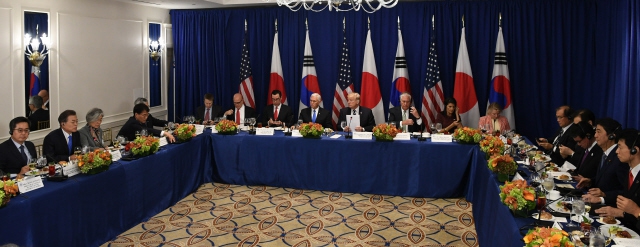 |
|
South Korean President Moon Jae-in, US President Donald Trump, and Japanese Prime Minister Shinzo Abe hold trilateral talks in New York on Sept. 21, 2017. (Blue House photo pool)
|
Trump yet to make any direct references to recent frictions
The US Donald Trump administration is adopting a wait-and-see approach on the deepening conflict between South Korea and Japan, refraining from any particular statement of a position on the latter’s controls on semiconductor material exports. Despite the major emphasis the US has placed on trilateral coordination to achieve North Korea’s denuclearization and contain China, it now appears to be holding back from intervening as it watches to see what effects the situation has on itself. On July 8, the US State Department reiterated its position stressing the need for trilateral cooperation by South Korea, the US, and Japan. In response to questions from the press, the office of the State Department spokesperson said, “As an ally and friend to both Japan and the Republic of Korea, it is critical to ensure strong and close relationships between and among our three countries in the face of shared regional challenges, including those posed by the DPRK, as well as our other priorities in the Indo-Pacific and around the world.” “The United States is committed to strengthening further our trilateral cooperation with Japan and the Republic of Korea. We remain unified in pressuring North Korea to denuclearize,” the State Department continued. The spokesperson also said the US “always pursues ways to strengthen relations between and among our three countries, both publicly and behind the scenes.” The response emphasized Washington’s more hands-off position while indicating that it is watching the situation closely. President Donald Trump has yet to make any direct references to the recent frictions between South Korea and Japan. Diplomatic sources in Washington said the US “does not appear willing to become actively involved in the situation.” This suggests that while relevant agencies such as the State and Commerce Departments are keeping abreast with daily reviews of the South Korea-US conflict, no signs have been detected of plans to state a particular position or attempt to mediate. The biggest reason for the US government’s silence appears to stem from the conclusion of the Trump administration – with its “America first” approach – that the situation has yet to deal any direct flow to US businesses. A foreign affairs source explained that there were “no signs of serious concern over the South Korea-Japan conflict coming from US industries.” At the same time, the US also appears to be reluctant to get involved because Japan’s economic retaliation measures against South Korea are in some sense modeled on Trump’s own pressure tactics against other countries using tariff and trade issues as diplomatic weapons. The South Korean government plans to dispatch Trade Minister Yoo Myung-hee and other Ministry of Foreign Affairs senior officials to Washington in the near future to wage an opinion campaign in the US. With Tokyo also lobbying the US, Seoul is obliged to explain to Washington about the unfairness of the situation and its potential negative impact on the US. But analysts are arguing that it would not be an appropriate approach to go beyond this sort of opinion campaign and request active mediation from the US between South Korea and Japan. The fear is that such mediation could lead later on to a diplomatic “bill” arriving with demands to participate actively in trilateral cooperation to contain China. The comfort women agreement between South Korea and Japan in December 2015 came about amid meditation from the US during the Barack Obama administration, but only led to relations between Seoul and Tokyo souring further. By Hwang Joon-bum, Washington correspondent Please direct comments or questions to [english@hani.co.kr]






